News
‘Horrifying sight’ of thousands of commuters stranded over rail strike
A total of 374 trains carrying almost 600,000 passengers daily islandwide came to a halt on Wednesday when railway workers launched a sudden strike, and despite widespread public dismay unions are vowing to continue industrial action.
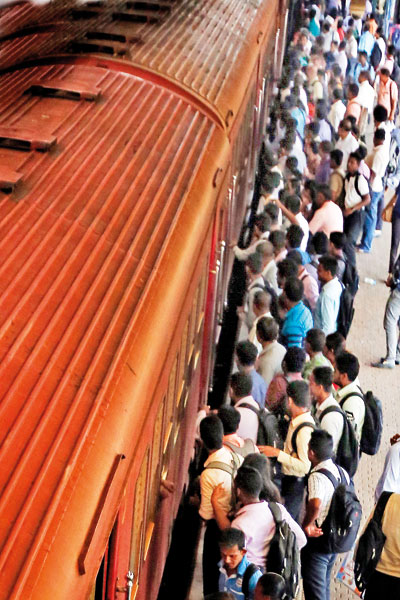
Chaotic scenes at Fort Railway station. Pic by M.A. Pushpa Kumara
Commuters were left stranded on the night the strike began, taken unawares by the stoppage. Many only reached home the following morning, using buses, while others took refuge in railway stations, unable to find transport home.
R.H. Gamini, who works at the Colombo dockyard, counted himself lucky that the meagre amount of money in his pockets was sufficient for him to find an alternative way back home to Udugampola on the night of the strike.
“When I look back, I wonder what if, like most days, I had just my season ticket in my hand? I would have had to either spend the night in the station or headed back home really late,” he said.
Mr. Gamini explained with a heavy heart how his family had been anxiously waiting till he came home with food rations so they could cook their meal that night.
“The government and the unionists are at loggerheads and we are beaten by both forces and are helpless,” he said.
Regular rail commuter M.M. Upasena had to take three buses to reach his home in Magalegoda.
“A lot of people were stranded that night. The sight was horrifying – many women and children were helpless,” Mr. Upasena, an employee at a five-star hotel, said.
“It’s okay for them [the unionists] to protest but please, inform the public beforehand and don’t put them in a situation where they are helpless,” he pleaded.
Gnanamurali Thavavanidi, a teacher from Jaffna, had been visiting her sister in Colombo and was returning home on Thursday. She came to the Fort Railway Station expecting that she and her family would be taking the train to Jaffna.
“We booked our tickets early, hoping that we could travel back home by train, which is the most convenient way of travel for us,” she said. Because of the strike, they were forced to travel all the way to Jaffna by bus, paying heavily for their tickets.
Employed on a daily wage at a Colombo tea kiosk, R.A. Yasanthi has to use a train to travel from Ganemulla because it is the cheapest transport. “What happened to us on Wednesday was very unfair,” she said. “I had to wait until one in the morning to get a bus to go home. I reached home only at 3am.”
Kolitha Gunawardene expressed the same outrage: his normal single train ride home to Veyangoda became four bus journeys on Wednesday night, and he condemned the union action.
Stationmasters, engine drivers, railway controllers and railway supervisor managers are involved in the strike launched on August 8 and are refusing to stop industrial action until the government accedes to their salary demands.
“Over time, promotions haven’t been reflected in our salaries,” Railway Engine Drivers Union Secretary Indika Dodangoda said. “The higher the promotion the lesser the salary which doesn’t make any sense.”
When questioned whether the suddenness of the strike was reasonable, he claimed prior notice of the stoppage had been issued. That warning, however, had been given on a previous occasion a month ago when the unions threatened a strike that was later called off due to assurances given by the government.
The All-Ceylon Railway Union, which did not take part in Wednesday’s stoppage and says it will continue to operate trains on condition that its members’ salaries will also be revised and increased, criticised the other unions.
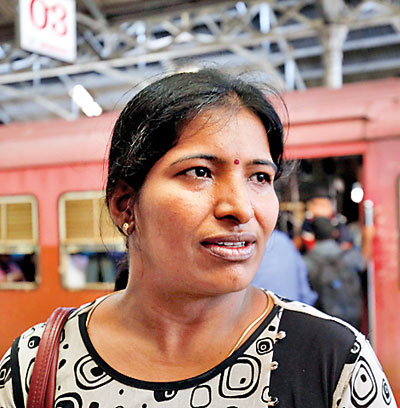
Gnanamurali Thavavanidi
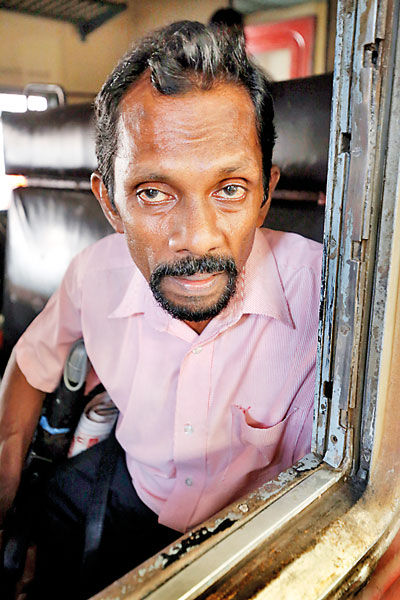
R.H. Gamini
“We regret the inconvenience caused to the public due to the sudden trade union action which was launched by the four sectors and we think that it was very unfair,” All-Ceylon Railway Union chief S.P. Vithanage said.
Mr. Vithanage said the other unions had a right to strike over salary scales but not on the matter of a salary increment if the Railway Department was privatised – a step he alleged the government was contemplating.
Finance Minister Mangala Samaraweera told parliament a pay rise given to railway workers would create a salary anomaly with other public institutions.
Mr. Samaraweera gave an assurance that the salaries of all public sector employees will be increased within two to three months through orders of the planned new Special Public Commission mooted by President Maithripala Sirisena. Mr. Samaraweera is refusing to hold discussions with the railway unions unless they report back for work.
“The statement made by the Minister of Finance with regard to the salary anomaly is very reasonable and it was very unfair of the trade unions to go on strike,” Ministry of Transport and Civil Aviation Secretary G.S. Withanage said.
He said a Cabinet paper put forward to increase the salaries of the railway workers was never cancelled but merely deferred. “We informed the railway unions regarding the deferment and requested them to not launch a trade union action and we assured them that matters will be sorted,” Mr. Withanage said.
By Friday evening, measures were taken to operate nine trains from Colombo to Halawatha, Kandy, Mahawa, Anuradhapura, Rambukkana, Matara, Galle, Avissawella and Polgahawela.
Assistance was also sought from the Sri Lanka Transport Board (SLTB) to provide transport to the public.
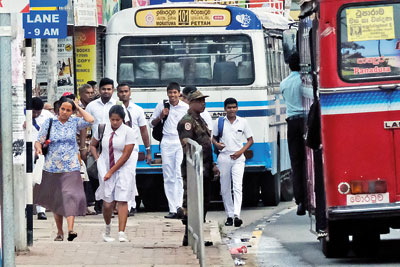
Students who are sitting for their A/Levels have been greatly inconvenienced by the strike. Pic by Amila Gamage
“Around 6,000 buses have been deployed islandwide, due to the ongoing railway strike,” SLTB Chairman Ramal Siriwardena said.
“Priority is diverted to the students sitting for their Advanced Level examinations this year,” he added.
Leave has been cancelled for all SLTB drivers, conductors and mechanics.
The army also stepped in to transport people during the strike. Army Media Spokesman Brigadier Sumith Atapattu said 28 army buses were pressed into service for long-distance public transport while nine other army buses were used to carry Advanced Level students from Maharagama, Gampaha, Veyangoda, Nittambuwa, Ganemulla, Homgama Meegoda and Kalutara.
“About 100 army personnel were deployed to help transport people to their destinations,” Brigadier Atapattu said.
Police have been instructed to be lenient with traffic rules for buses, not insisting that buses follow their specified route permit.
Passengers with a train season ticket will be allowed to travel free on SLTB buses. Mr. Withanage said there were practical difficulties in extending the same arrangement to travel on private buses due to difficulties in calculating and claiming costs.
No complaints had come in from examination centres over late arrivals due to the strike, the Commissioner-General of Examinations, B. Sanath Pujitha, said.
“The support extended by the SLTB and the private buses made it possible for the students to reach their destinations on time without any complaints,” he said.
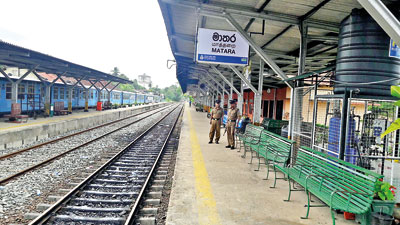
Two policemen, the only sign of life at the empty Matara station. Pic by Krishan Jeewaka Jayaruk
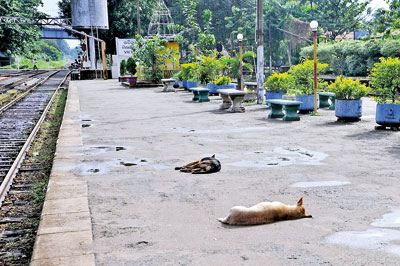
Veyangoda: Dogs have their day at a deserted station. Pic by Priyantha Wickramaarchchi

